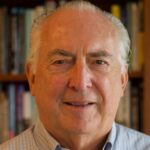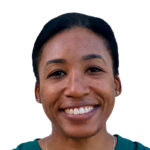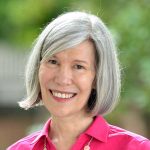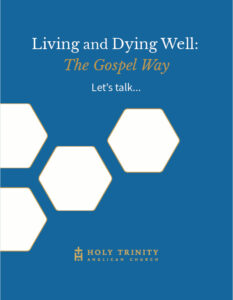About Our Speakers
John Alsdorf
 Since retiring from his corporate career in 2002, John has been active in a variety of teaching and leadership roles in church programs. Here in Raleigh, from 2016 through 2018, he partnered with his wife, Katherine, in establishing Holy Trinity Anglican Church’s New City Fellows program. He currently is active as part of a team in New York City developing a curriculum to help adults of all ages to live more joyfully and wisely in light of our shared mortality. Over the years he has taught numerous adult classes aimed at deepening understanding of and commitment to the Christian faith. He also just completed eight years as Trustee for InterVarsity Christian Fellowship, a national campus ministry.
Since retiring from his corporate career in 2002, John has been active in a variety of teaching and leadership roles in church programs. Here in Raleigh, from 2016 through 2018, he partnered with his wife, Katherine, in establishing Holy Trinity Anglican Church’s New City Fellows program. He currently is active as part of a team in New York City developing a curriculum to help adults of all ages to live more joyfully and wisely in light of our shared mortality. Over the years he has taught numerous adult classes aimed at deepening understanding of and commitment to the Christian faith. He also just completed eight years as Trustee for InterVarsity Christian Fellowship, a national campus ministry.
Lydia S. Dugdale, MD
 Lydia Dugdale MD, MAR, is the Dorothy L. and Daniel H. Silberberg Associate Professor of Medicine and Director of the Center for Clinical Medical Ethics at Columbia University. Prior to her 2019 move to Columbia, she was Associate Director of the Program for Biomedical Ethics and founding Co-Director of the Program for Medicine, Spirituality, and Religion at Yale School of Medicine. She is an internal medicine primary care doctor and medical ethicist. Her first book, Dying in the Twenty-First Century (MIT Press, 2015), provided the theoretical grounding for The Lost Art of Dying: Reviving Forgotten Wisdom. She lives with her husband and daughters in New York City. http://lydiadugdale.com
Lydia Dugdale MD, MAR, is the Dorothy L. and Daniel H. Silberberg Associate Professor of Medicine and Director of the Center for Clinical Medical Ethics at Columbia University. Prior to her 2019 move to Columbia, she was Associate Director of the Program for Biomedical Ethics and founding Co-Director of the Program for Medicine, Spirituality, and Religion at Yale School of Medicine. She is an internal medicine primary care doctor and medical ethicist. Her first book, Dying in the Twenty-First Century (MIT Press, 2015), provided the theoretical grounding for The Lost Art of Dying: Reviving Forgotten Wisdom. She lives with her husband and daughters in New York City. http://lydiadugdale.com
Crystal Pressley, MD
 Dr. Pressley is a board-certified general surgeon with certification in critical care. She serves as an Adjunct Assistant Professor in the Department of Surgery at UNC and Assistant Professor in the Department of Surgery at Campbell University School of Osteopathic Medicine, and is also the surgery clerkship director at WakeMed for CUSOM. Crystal is a fellow of the American College of Surgeons, is published in the American Journal of Surgery and is an alumna of the New City Fellows program class of 2022. Born and raised in Cary, NC, she is dedicated to community outreach and assisting those in need. Currently, Crystal is practicing general surgery, trauma and critical care at WakeMed in Raleigh, NC.
Dr. Pressley is a board-certified general surgeon with certification in critical care. She serves as an Adjunct Assistant Professor in the Department of Surgery at UNC and Assistant Professor in the Department of Surgery at Campbell University School of Osteopathic Medicine, and is also the surgery clerkship director at WakeMed for CUSOM. Crystal is a fellow of the American College of Surgeons, is published in the American Journal of Surgery and is an alumna of the New City Fellows program class of 2022. Born and raised in Cary, NC, she is dedicated to community outreach and assisting those in need. Currently, Crystal is practicing general surgery, trauma and critical care at WakeMed in Raleigh, NC.
Justin N. Barfield
 Justin is a licensed funeral director, embalmer and assisting management associate with Bryan-Lee Funeral Homes in Raleigh, with affiliate locations in Garner and Angier, NC. A first-generation funeral director, Justin began his career in funeral service at 15 years old with the local funeral establishment in his hometown of Tarboro, NC. Having experienced the deaths of three grandparents in less than a year, Justin found the role of the funeral director to be quiet and comforting, which led him to pursue that same calling of providing families with care and guidance during their time of need. Justin is a member of the North Carolina Funeral Directors Association and Order of the Golden Rule, and an alumnus of the New City Fellows program class of 2022. He and his wife, Donna Lynn, live in Raleigh where they are active members of Holy Trinity Anglican Church.
Justin is a licensed funeral director, embalmer and assisting management associate with Bryan-Lee Funeral Homes in Raleigh, with affiliate locations in Garner and Angier, NC. A first-generation funeral director, Justin began his career in funeral service at 15 years old with the local funeral establishment in his hometown of Tarboro, NC. Having experienced the deaths of three grandparents in less than a year, Justin found the role of the funeral director to be quiet and comforting, which led him to pursue that same calling of providing families with care and guidance during their time of need. Justin is a member of the North Carolina Funeral Directors Association and Order of the Golden Rule, and an alumnus of the New City Fellows program class of 2022. He and his wife, Donna Lynn, live in Raleigh where they are active members of Holy Trinity Anglican Church.
The Rev. Claudia Greggs
 Claudia grew up in Detroit, went to college in Boston and after moving to New York City, she heard the good news of the gospel and turned in faith to Jesus Christ as Savior and Lord. She attended the Yale Divinity School in New Haven, Connecticut, graduating in 1987, and was ordained the following year to the priesthood. In 1994, she married the Rev. Dr. Gil Greggs and moved to North Carolina, finding at last her true home.
Claudia grew up in Detroit, went to college in Boston and after moving to New York City, she heard the good news of the gospel and turned in faith to Jesus Christ as Savior and Lord. She attended the Yale Divinity School in New Haven, Connecticut, graduating in 1987, and was ordained the following year to the priesthood. In 1994, she married the Rev. Dr. Gil Greggs and moved to North Carolina, finding at last her true home.
Claudia served in a number of churches before joining the staff of Holy Trinity Anglican in 2014 as clergy associate for Christian Formation. Helping people find abundant life in Jesus Christ is her passion in ministry. She and Gil have two children, Caleb and Emily, a son-in-law, Andrew and a grandson, Alex.


 In this updated version of the workbook, you will find expanded content sections on each of the four topics or frameworks:
In this updated version of the workbook, you will find expanded content sections on each of the four topics or frameworks: Since retiring from his corporate career in 2002, John has been active in a variety of teaching and leadership roles in church programs. Here in Raleigh, from 2016 through 2018, he partnered with his wife, Katherine, in establishing Holy Trinity Anglican Church’s
Since retiring from his corporate career in 2002, John has been active in a variety of teaching and leadership roles in church programs. Here in Raleigh, from 2016 through 2018, he partnered with his wife, Katherine, in establishing Holy Trinity Anglican Church’s 


